Turkey suffered a nightmare in its economy in 2018 and if the same problems repeat in 2019, foreign investors will withdraw their investments, said economists attending a summit in the northwestern province of Bursa, opposition Sözcü newspaper reported on Saturday.
The foreign investors demanded credible policies at the eighth Uludağ Economic Summit organised by Capital and Economist magazines with the participation of some 2,000 economic experts from Turkey and abroad.
“We do not want to live 2018 again. As foreign investors, I can say that 2018 was a nightmare,” said Timothy Ash, a strategist at BlueBay Asset Management in London.
Turkish lira hit record lows last year in August, following a diplomatic row between Ankara and Washington over the almost two year detention of an American pastor and Turkish President Recep Tayyip Erdoğan’s unorthodox economic policy that undermined the central bank’s independence.
The Turkish Finance Minister Berat Albayrak has repeatedly said the exchange rate volatility the country witnessed last year was the result of a foreign attack.
There were many statements from Ankara that explained the problems in the economy as a foreign plot, Ash said at the summit, while Albayrak said in a television program that Turkish lira’s slump on Friday was the result of a manipulative social media campaign.
Lira dropped by more than 4 percent against the dollar on Friday, amid new tensions between Turkey and the United States and after an unexpected fall in the Turkish central bank’s foreign currency reserves.
The central bank officials told both Reuters and Bloomberg that the foreign currency reserves stemmed from sales of forex to energy-importing firms and a foreign debt payment. Yet, their statements were not enough to calm down speculations that the decline in reserves signalled the central bank was using its holdings to prop up the currency before elections on March 31 .
The central bank also tightened monetary policy on Friday by announcing that it had suspended one-week repo auctions for an undefined length of time. As a result, the average cost of funding in Turkey saw a near record jump, Reuters reported . The central bank has been keeping one-week repo lending rate at 24 percent since September to help arrest a slump in the lira and curb inflation
Ash said that he has observed some positive changes in the direction of the economy, adding that, following local elections set to take place on March 31, Turkey should use a four-year stretch without elections to implement credible fiscal policies.
“We, foreign investors, are not enemies, if we earn money, you will earn money, too. We want to invest more. But if we witness another year like 2018, we will not invest again and will withdraw the existing ones,” Ash said.
Robin Brooks, chief economist at The Institute of International Finance, said that the current lira-dollar rate was fair and normal, adding that the U.S. President Donal Trump’s policies also complicated things for emerging economies. “It might be beneficial to decrease Turkey’s dependency to foreign capital. If more predictable policies can be encouraged, expectations can be realised,” Sözcü quoted Brooks as saying.
Turkish Economy Bank (TEB) General Manager Ümit Leblebici said the West should not leave Turkey alone, as otherwise Turkey tried to find its own solutions. “Our neighbourhood is a bit dangerous. Everybody has different relations, interests. Our neighbourhood is spooky,” Sözcü quoted Leblebici as saying.
Turkey’s relations with the United States and Europe was also discussed in the meeting and Ash said that Ankara should resolve the ongoing tension with Washington over the purchase of Russian S-400 missile systems.
Turkish authorities have repeatedly said that Ankara would not cancel the deal with Moscow for S-400s, despite Western attempts to dissuade it from the purchase. Washington, warned Ankara several times this month that acquiring Russian systems might have grave consequences.
Soner Çağaptay, the director of the Turkish Research Program at The Washington Institute for Near Eastern Policy, told the Voice of America this week that U.S.-Turkish relations was heading toward a perfect storm. Washington is likely impose harsh sanctions on Turkey over the purchase of Russian S-400 missile systems, according to the analyst.
Source: Ahval News



